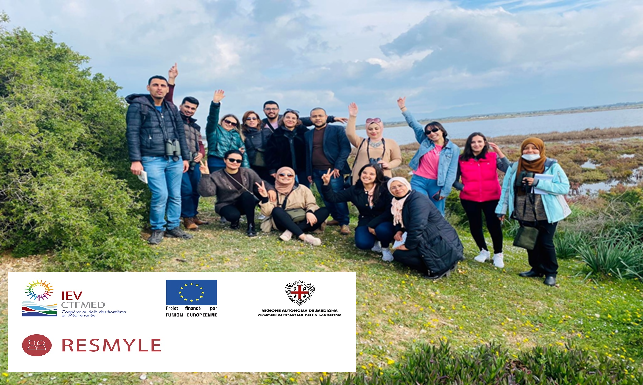RESMYLE encourages 12 NEETs to preserve and maintain a natural site sensitive to pollution in Sebkhet Soliman, Tunisia

It has been a week since the 12 NEETs (Neither in Education, nor in Employment, nor in Training), young people aged from 18 to 30, from Tunisia (9) and Jordan (3), participated in the training workshop organised by the Higher Institute of Environmental Sciences and Technologies (ISSTE) of Borj Cédria, a RESMYLE partner, from 7 to 20 February on the preservation of a natural site sensitive to pollution; the site of Sebkhet Soliman: RAMSAR site and ZICO in partnership with the Association of Environment and Development of Soliman (AEDS).
The first days were devoted to the discovery of Sebkhet Soliman which is located at the southern end of the Gulf of Tunis. It is one of the few places in the region that retains water throughout the summer and is an important refuge for waterbirds, hosting nesting populations of species such as the Marbled Teal, White Stork, Mediterranean Gull, Cangek Tern and Collared Pratincole. Sebkhet Soliman also contains a typical wetland flora dominated by halophytic plants.
The young people first visited Sebkhet Soliman and learned about the different components of the site and its geographical boundaries.
Three working groups were organised to collect the different types of plants:
- medicinal,
- halophytes,
- fodder.
On their return to ISSTE, the young people sifted, cleaned and dried the collected plants in order to prepare herbariums.
The three groups then prepared and presented the mindmapping of their ideas for Sebkhet Soliman to the supervisory team in an efficient and logical way.
Finally, this first part ended with the discovery and census of migratory birds using specific observation equipment (binoculars and telescopes). Different species were identified on the water bodies of Sebkhet Soliman. For each species, an identification sheet will be prepared by the participants.
The challenge of the next stage will be to diagnose the sources of water pollution and measure its quality. To do this, a visit to the various points of discharge of pollutants into the rivers connected to the Sebkha (Oued Seltane & Oued El Bey) will take place as well as a visit to an urban wastewater treatment plant with the National Sanitation Office (ONAS).
Following these visits, a brainstorming workshop on possible solutions to minimise water pollution will be held in order to build advocacy with stakeholders (authorities, companies, etc.).
This workshop is one of the activities of the project RESMYLE - Rethinking employment and social inclusion of Mediterranean youth through sustainable development" implemented locally by ISSTE and led by CDE Petra Patrimonia, co-financed by the ENI CBC Med Programme of the European Union.









